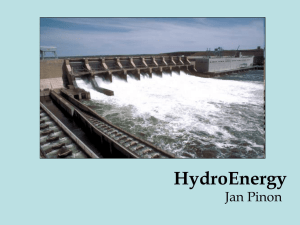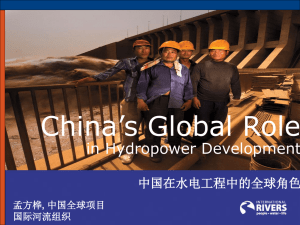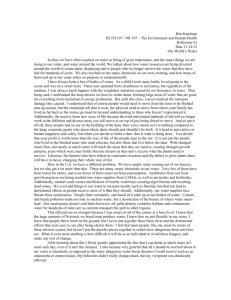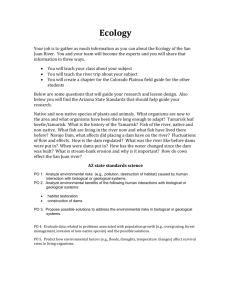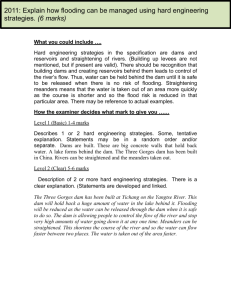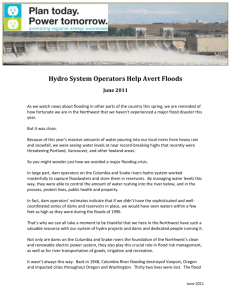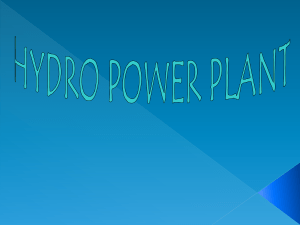Hydropower Electricity From Moving Water
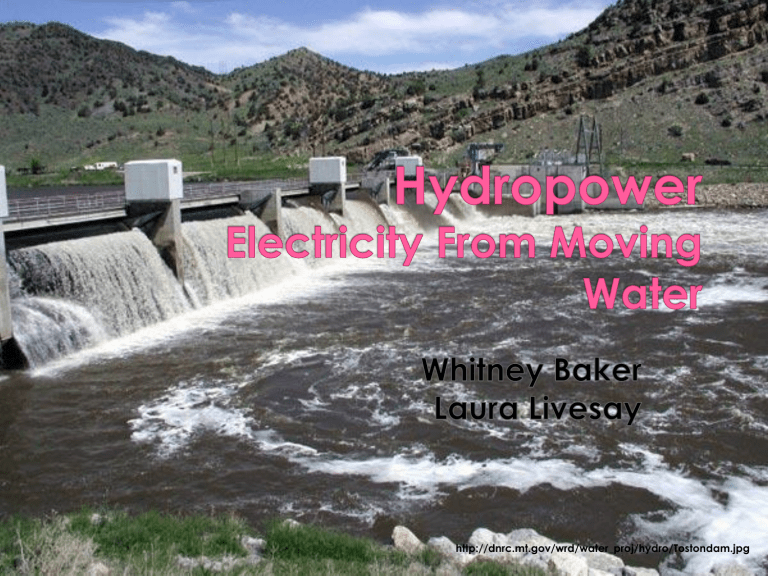
http://dnrc.mt.gov/wrd/water_proj/hydro/Tostondam.jpg
It is a renewable source of energy
Produces energy through hydroelectric power http://www.tehrantimes.com/News/10506/03_GEORGIA%20HYDRO.jpg
There is minimal pollution
Reduces greenhouse gases
It is renewable and clean
The water used to power the plant is free from nature http://upload.wikimedia.org/wikipedia/commons/f/fd/Haditha_dam.png
How it functions
http://www.electrical-res.com/EX/10-16-08/hydroelectric_power_plant.gif
How it functions
The sluice gates measure the flow rate in open channels and regulates the water flow
The penstock is the pipe inside the structure that delivers water to hydraulic turbines
The turbines spin when the water is let through
How it functions
The generator turns the water’s kinetic energy into energy we can use
The powerhouse lets the dam be selfsustaining
The transformer takes the energy produced and makes it into useable energy for homes and businesses
There aren’t many big places left to install hydropower plants.
They can install low head hydropower plants almost anywhere.
http://www.green-trust.org/hydro.htm
The pond builds up sediment
It keeps the pond from storing water
The sediment has to be dredged to get rid of this problem http://www.gina.gov.gy/dailyphoto/081215/The%20dam%20being%20constructed%20aback%20Buxton,%2
0East%20Coast%20Demerara%20to%20prevent%20water%20entering%20residential%20areas.JPG
50-100 years http://cleantechlawandbusiness.com/cleanbeta/wpcontent/gallery/cache/496__570x420_johnstown-dam-breaks.jpg
Negatives
The risk of failure: When the Big Bay Dam in
Mississippi broke in 2004, it destroyed over 50 homes.
Dams can destroy wildlife habitats, which means that all the species living there are without homes.
Dams can also drain wetlands and cause river pollution by reducing the river flow to such a low level that the river is not able to selfcleanse any longer.
Technological Obstacles
Must have river with place for water to go upstream
Must have room for machinery
Must have resources to build it
If machinery malfunctions the dam is pointless!
Must have way to get electricity to homes
If machine rooms flood an electric SHOCK can occur!!!
Average reconstruction cost: $5 million
Reconstruction is a two-phase process
Secondary spillway built (first phase)
Granite blocks fixed because tree roots ruin them
The U.S. generates only 7-10% of the electrical supply by hydropower http://www.electrical-res.com/EX/10-18-08/hw_power_line.jpg
Water Turbidity
Flooding
Fish migration is disturbed
Insect disease abundance
Habitats destroyed
Uncertainty
Pros: Environment
High net energy
High efficiency
No CO2 during operations in temperate areas
Can provide flood control below dam
Provides irrigation water
Cons: Environment
Flooding land
High CO2 emissions from rapid biomass decay in shallow tropical reservoirs
Decreases fish harvest below dam
Decreases flow of natural fertilizer to land below dam http://www.bing.com/images/search?q=flooding+by+dam&FORM=BIF
D&adlt=strict#focal=5249bbf4bd6015e1b41e92abc0251da5&furl=http
%3A%2F%2Fwww.hazchek.com%2Fimages%2Fflood2.jpg
Economic Costs
Dams are very expensive to build and may not provide sufficiently economical electrical power generation, water supply, or irrigation. http://s0.geograph.org.uk/photos/99/98/999804_f781b8af.jpg
Political Obstacles
It can cause upstream flooding
Lowers levels of water downstream
Countries get into wars or disagreements about this http://i.telegraph.co.uk/telegraph/multimedia/archive/00674/china-dam-flooding_674281c.jpg
Types of Hydropower Plants
Conventional: one-way water flow
Run-of-River: little, or no, stored water.
Weather changes cause fluctuations in power output.
Storage: storage to offset seasonal changes…constant supply of electricity.
Large dams enough storage for years.
Pumped Storage: reuse water. After it is used it flows into reservoir, then some pumped back up and reused.
http://www.need.org/needpdf/infobook_a ctivities/SecInfo/HydroS.pdf
http://ga.water.usgs.gov/edu/wuhy.html
http://users.owt.com/chubbard/gcdam/ht ml/hydro.html
http://www.naturalstandard.com/indexabstract.asp?createabstract=/monographs/enviro/genericdams.asp
Sources
http://www.bing.com/images/search?q=flood
&form=QBIR&qs=n&sc=8-
5&adlt=strict#focal=afa3056319fee217bd765c4 dff20b141&furl=http%3A%2F%2Fpasc.met.psu.e
du%2FPA_Climatologist%2Fextreme%2FFloods%
2Fflood%2520house%2520pic.jpg
http://www.arch.mcgill.ca/prof/sijpkes/arch37
4/winter2001/dbiggs/three.html
http://www.educationcenteronline.org/articles
/Engineering-Careers/Problems-and-Benfits-of-
Building-a-Dam.html
http://www.arch.mcgill.ca/prof/sijpkes/arch37
4/winter2001/dbiggs/enviro.html
http://www.green-trust.org/hydro.htm
http://www.rainforestinfo.org.au/deep-eco/Dams.html
http://www.internationalrivers.org/en/node/1476 http://www.consumerenergycenter.org/renewables/hy dro/index.html
http://oldwww.wii.gov.in/eianew/eia/dams%20and%20 development/kbase/contrib/soc195.pdf
http://www.wickedlocal.com/medford/features/x19613
6512/State-in-process-of-rebuilding-Mystic-Lakes-dam http://extension.missouri.edu/publications/DisplayPub.a
spx?P=G1548


